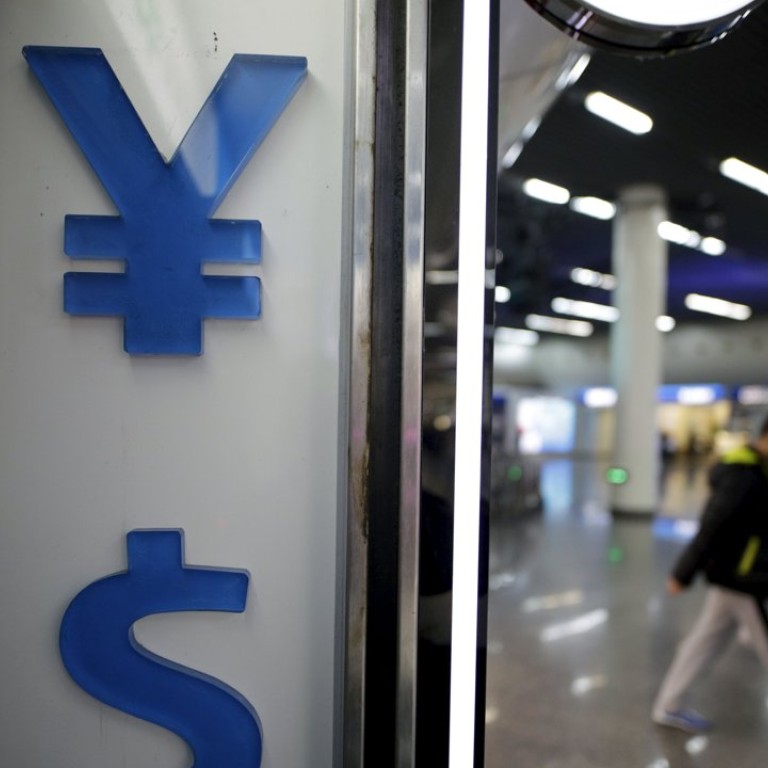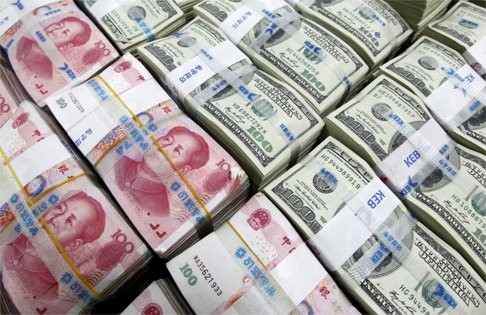
China’s central bank fends off attack on yuan in Hong Kong
The People’s Bank of China (PBOC) on Monday fought off an attack on the yuan by currency speculators, in the process driving up the cost of borrowing for offshore yuan to its highest ever.
CNH Hibor, or the interbank rate for offshore yuan in Hong Kong, shot up by 10 per cent to 13.396 per cent, the highest on record since the Treasury Markets Association started fixing the interest rate in June 2013.
The one-week rate jumped 417 basis points to 11.23 per cent while the three-month rate rose 91 basis point to 7.24 per cent.
READ MORE: China currency head urges investors not to listen to ‘talking down’ of yuan
Jasper Lo Cho-yan, a director of Tung Shing Futures, said the PBOC intervened in the local offshore yuan market, buying up yuan and selling down the US dollar, which dried up yuan liquidity and pushed up the interest rate.
“It’s very unusual for the interbank rate to jump 10 per cent in a single day. The market believes the PBOC is trying to squeeze the interest rate up to make it expensive for speculators to cover their short positions,” Lo said.
“The Hong Kong Monetary Authority (HKMA) did something similar during the 1998 currency crisis, when it drove interest rates higher to drive away currency speculators,” Lo said.
The PBOC set the currency’s reference rate higher on Monday to allow it to strengthen. Offshore yuan traded by international investors bounced by 0.66 per cent to 6.6373 per cent at 4.30pm.

Onshore yuan traded on the mainland stood at 6.5807 at 4.30pm, stronger by 0.19 per cent from Friday’s close, after the currency fell 1.5 per cent last week. The gap between onshore yuan and offshore yuan narrowed to 566 basis points, from a record high of 1,400 basis point last Thursday.
Tommy Ong, managing director of treasury and markets at DBS Hong Kong, said that after the PBOC started buying up offshore yuan from the Hong Kong market, it took it back to mainland China and held it there.
“The PBOC’s intervention helped boost offshore yuan and drove up CNH Hibor,” Ong said. “The yuan Interest rate in the Hong Kong market will not affect the mainland economy.”
Credit Suisse senior currency strategist Heng Koon-how said interest rates in the offshore yuan markets have been jumping over the past few days.
“This is a classic sign of a short squeeze. Given the elevated volatility, some forex brokerage houses may have increased the margin required for taking offshore yuan positions,” Heng said.
“In addition, some investors have borrowed heavily and taken loans in offshore yuan to leverage up and invest in onshore yuan products and bonds. With offshore yuan weakening and volatility increasing, this leveraged investment may have suffered and need to be unwound. All these resulted in the short squeeze in front-end offshore yuan interest rates,” Heng said.
Lo believe the PBOC may now work with other central banks to rescue the yuan, when needed. In March 2011, a group of central banks joined hands to rescue the yen.
He, however, said these measures would only help the yuan rebound in the short term. He is still bearish over the outlook of the yuan, which is expected to drop to 6.80 to the US dollar this year and to 7 next year.
An HKMA spokeswoman said the offshore Hibor rate rise showed interbank operations remained orderly despite the tight liquidity. The HKMA, she said, provided liquidity support to banks and that there were more request to use the facilities on Monday. The authority will monitor the market development, she added.

